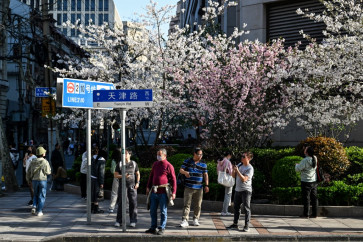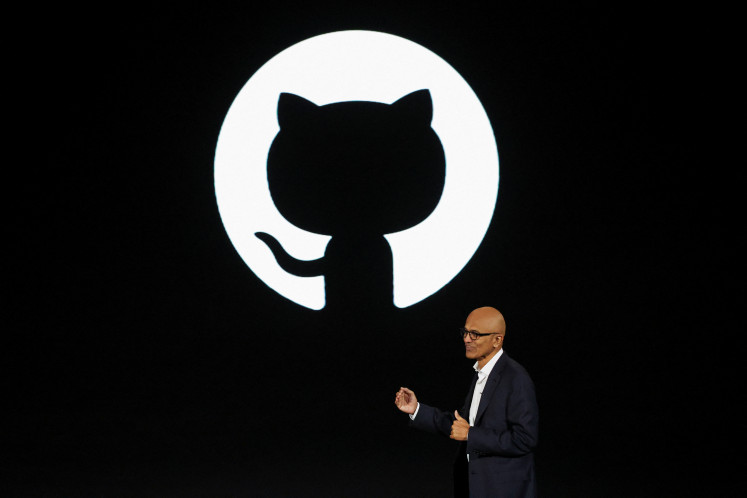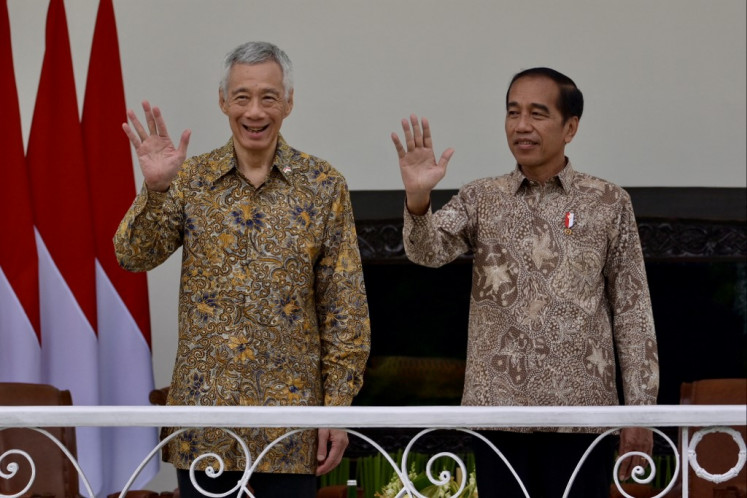Rizwan Alamsjah: Art of marketing based on sincerity
Who would have ever guessed that someone who tried to quit three times from a company at the beginning of his career would become one of the spearheads of the company? Meet Rizwan Alamsjah, the director of PT Krama Yudha Tiga Berlian Motors (KTB), which was previously called PT New Marwa 1970 Motors, the authorized distributor of Mitsubishi cars and other vehicles representing Mitsubishi Motors Corporation (MMC) and Mitsubishi Fuso Truck & Bus Corporation (MFTBC) in Indonesia
Change Size

W
ho would have ever guessed that someone who tried to quit three times from a company at the beginning of his career would become one of the spearheads of the company? Meet Rizwan Alamsjah, the director of PT Krama Yudha Tiga Berlian Motors (KTB), which was previously called PT New Marwa 1970 Motors, the authorized distributor of Mitsubishi cars and other vehicles representing Mitsubishi Motors Corporation (MMC) and Mitsubishi Fuso Truck & Bus Corporation (MFTBC) in Indonesia. His contribution has been acknowledged by his superiors and colleagues. He is also known as a leading figure in Indonesia’s automotive industry.
“If I remember correctly, I wanted to quit within the first six months of working here and again almost every six months for a while after. It happened three times. Maybe I was used to working for American companies, because I was surprised with the working style at a Japanese company. It is totally different,” Rizwan explained.
His desire to resign from KTB was not due to his remuneration or position, but more because of the leadership style. Rizwan, who had previously worked for Arthur Young (now Ernest & Young) as an auditor and management service provider, was used to the American leadership style, which was fast and with freedom in making decisions. So he felt uncomfortable with what he considered a rigid management style.
“Indeed, there is a difference in each culture. American companies don’t bother with what you do as long as the mission is accomplished. But in Japanese companies decisions are made together, so it takes time and is much slower. I was initially frustrated,” recalled Rizwan.
“But after working for one year I realized that Western and Japanese management styles are equally as good. The difference lies only in the ‘tools’. Both have been proven to be just as effective, just look at the many leading and successful Japanese companies in the world,” he added.
What does he find interesting about working for Mitsubishi that has made him stay there? Rizwan answered with just one word:
commitment.
“Here ‘no’ means ‘no’ and ‘yes’ really means ‘yes’! Mitsubishi always strives to provide the best quality in everything. I have learned that here you have to work ideally. So we must always work hard and never feel satisfied with the result, because competitors expect that. If we feel satisfied we will be complacent and that will be the end of us. We have existed for 40 years and that is an achievement in itself,” said Rizwan, a graduate of the University of Indonesia.
He did not start his career at KTB at the very bottom of the ladder but as a departmental supervisor.
Rizwan, who has worked at KTB for almost 30 years, made a significant contribution in designing KTB from the very beginning: from a concept on paper to its major size today. It now has its own plant and is supported by more than 150 dealers
nationwide.
“As I handled a department, I had a managerial position and for the expansion of the company all of us assisted the director in the overall preparation. I was also involved in the forming of the company because there was a personnel shortage. When we started to develop the engine plant, PT Krama Yuda Manufacturing manufactured the components. I recruited new employees and also worked as an accountant. Finally when the company was running smoothly, I held two positions again as cooperate director because there was no one else,” said Rizwan, who is also chairman IV of the Association of Indonesian Automotive Industries for the February 2010-December 2013 period.
Along with the company’s progress and his achievements, Rizwan also rose in position at the company. In February 1999, he became the administration and finance director. However, this position was short-lived because the company needed his energy and ideas during the 1997-1998 economic crisis that also hit the country’s automotive industry. Just two months later he was appointed marketing director, and continues to hold this position until today. Marketing was the most difficult division at that time because there was almost no demand and people’s purchasing power was diminishing. From regular sales of 7,000 units per month, KTB had to get used to selling only 200 units per month. Rizwan had to work hard for better sales and to save the company.
“There were almost no buyers and very low demand. That was the hampering factor. I was worried. Clearly, the survival of the company depended on marketing. If marketing fails, everything will be finished. So, we tried to develop the market right from the start. Just like a fisherman who usually waits for the direction of the wind, I was waiting for some conducive economic signs. At the same time the ship, meaning the company, was made cost efficient,” said Rizwan.
“We speeded up the retirement of employees. Thank goodness, our sales gradually improved and we could soon pay off the huge long-term loan from our principal,” he explained in a modest tone.
Under Rizwan’s leadership, KTB now ranks among the top three automotive companies in Indonesia.
In 2005, KTB recorded impressive sales of 1.5 million vehicles since 1970. In 2006, when the market was unfavorable due to fluctuating international oil prices, KTB held second position.
In 2007, KTB was again in second position after exceeding its sales target of 50,000 units, totaling 61,547 units with a market share of 14.2 percent. And finally in 2009, when the global economic crisis was impacting various sectors including the automotive industry, KTB still managed to exceed its sales target with total sales of 61,735 units and a market share of 12.7 percent.
What is the key to all these achievements?
“Quality. I have learned that selling automotive products is not like selling other goods and services. We must be ‘married’ or closely related to our customers. As long as they own our products they will need us. So, our service and spare parts must be reliable. All three components are equally important: sales, service and spare parts. Selling cars is not easy. Customers will reject cheap cars that are problematic. Image and brand are very important,” he said.
“The first basic principle is sincerity. Of course we want to make a profit, but not at the expense of our customers. We have to maintain a sincere relationship with our customers, just like in a family. The proof is that our products have survived for three generations,” he said.
And what is the company’s sales target for this year? Based on a favorable market, KTB has set an optimistic target of 90,000 units.
“The actual sales figure may be more than that as 90,000 is not a difficult target,” he said confidently. Rizwan added that automotive sales will improve further in the next five years and major improvement will take place in Asian countries, such as China, India and ASEAN member countries. However, he said, there should be no negative surprises in the form of unfavorable government regulations.
“The government should be careful and not shock the business sector. One still remembers during the crisis when fuel prices were increased by more than 100 percent. Such a shocking step would certainly cause the industry to collapse. Any price increases should be gradual, say by 10 percent at a time. This way the market can adapt to the changes. Who benefits if the market is unfavorable and less tax is paid to the government? No one benefits in such a situation, right?” he said.
What is the key to Rizwan’s
success?
“First, pessimism is part of a problem, while being optimistic is challenging. Second, sincerity is very important. Thirdly and just as importantly, one has to be creative and smart,” he said.
Background
Name: Rizwan Alamsjah
Place/date of birth: Bandung, Dec. 1, 1952
Education
Bachelor of economics, the University of Indonesia
Experience
April 1999-present: Marketing director,
PT Krama Yudha Tiga Berlian Motors (KTB)
Feb 1999: Director of administration, KTB
1996-1999: Director of project coordination, KTB
May 1991: Deputy general manager of project coordination, KTB
April 1991: Deputy general manager of planning, KTB
1989 - 1991: Manager of project coordination, KTB
1985 - 1989: Manager of planning, KTB.









